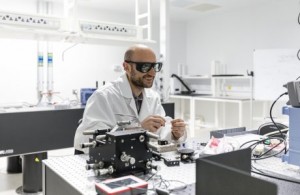Bristol’s status as a global centre for innovation in telecoms hardware has been boosted by plans to open a £2.5m research centre in the city.
The Future Telecoms Hub, which will launch this autumn on the Bristol & Bath Science Park at Emersons Green, will lead pioneering development work in next-generation technologies such as 5G networks, Artificial Intelligence (AI) and the Internet of Things.
Run by the Compound Semiconductor Applications (CSA) Catapult, it will focus on bringing compound semiconductor applications to life in three key areas – the road to net zero, future telecoms and intelligent sensing.
CSA Catapult said the hub would be at the forefront of the next wave of emerging applications, which will have an enormous impact on everyone’s lives.
Compound semiconductors combine two or more elements to create capabilities that cannot be achieved with conventional silicon devices, delivering performance improvements in power, speed and signal quality.
This makes them ideal to use in areas such as energy efficiency, electrified and autonomous vehicles, mobile applications, new smart-sensing devices for the Internet of Things and 5G applications.
As a result, they will enable a host of new applications in the electrification of transport, clean energy, defence and security and digital communications markets.
Work at the Future Telecoms Hub will be primarily focussed on the energy efficiency and security of telecoms hardware – factors that have become critically important in developing future networks that are robust and resilient and are less impactful on the environmental.
The Future Telecoms Hub will deliver translational research and provide access to commercial testbeds that improve the speed, energy efficiency and security of networks through CSA Catapult’s expertise in radio frequency (RF), photonics and quantum technologies.
The initial focus will be on improving the performance of power amplifiers—one of the biggest inefficiencies in existing telecoms networks—through load pull testing and design optimisation.
Collaborative research projects with Cardiff University and the University of Bristol will also be undertaken at the Future Telecoms Hub.
The base will complement CSA Catapult’s existing operations at its Innovation Centre in Newport, pictured above, and provide access to a wider range of expertise and resources.
Bristol is home to several major technology companies and research institutions and has a thriving innovation ecosystem in the aerospace and defence industries, where telecoms hardware is routinely used.
CSA Catapult chief executive officer Martin McHugh said: “The opening of our Future Telecoms Hub is a significant milestone in the Catapult’s journey as we expand our activities across the UK.
“Bristol has an established network of innovative companies and research institutions located within and around the city, as well as strong links with partners across the Western Gateway, so it was a natural fit for us to place our future telecoms capability here.
“With the widespread adoption of 5G and our increasing dependence on connected technologies, the demand for safe, secure and reliable telecoms infrastructure has never been greater.
“The Future Telecoms Hub will enable our partners to bring new telecoms technologies to market and allow us to continue to build supply chains, secure jobs and grow the UK economy.”
The Future Telecoms Hub will also link CSA Catapult activities across CSconnected, the world’s first compound semiconductor cluster in South Wales, and the Western Gateway, the UK’s first pan-regional partnership that brings together local leaders from two countries.
Bristol has led the way in semiconductor design since pioneering firm Inmos was set up in the city in the late 1970s to develop a revolutionary new chip. In the decades since it has spawned a huge network of leading-edge businesses in the sector.
Among them are XMOS, co-founded by David May, University of Bristol’s Professor of Computer Science and one of the industry’s leading figures.
XMOS in turn spawned other firms including Graphcore, the city’s first tech ‘unicorn’ which is developing interconnect processing unit (IPU) systems that lower the cost of accelerating AI applications in cloud and enterprise datacentre – so speeding up the machine learning revolution.
American supercomputer giant Cray has opened its European, Middle East and Africa (EMEA) headquarters in Bristol while Chinese tech giant Huawei also has a research & development hub in the city.






























